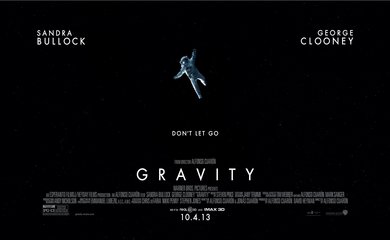The planets have realigned and America is no longer at the center of the Hollywood universe. Imaginative outsiders are heading west to mine California gold, and in true Invasion of the Body Snatchers style, foreigners now pull the artistic strings inside the behemoth studio system. Take for example that feat of spectacular special effects and cinematography prowess known as Gravity, an Avatar-rivaling blockbuster helmed by the Mexican director Alfonso Cuarón, which draws a line in the sand, giving us a glimpse into what the future marriage of art and commerce will look like.
Indeed, when I finally got around to catching the event in the theater – and it is an “event,” as if you don’t experience Gravity on the big screen in 3D there’s little point in seeing this clunky scripted flick at all – I was awestruck. Not by Cuarón’s skilled deployment of cutting edge technology (though Cuarón does have the mature self-assuredness and sense of pacing that allows for a patient unfolding frame by frame, rather than the rushed roller coaster ride we get from most of the studios’ American young guns). No, I was struck by the unsettling awareness that Cuarón and his financial backers couldn’t care less what this American film critic – or any U.S. moviegoer for that matter – thought about his film, which revolves around two American astronauts stranded in the cosmos.
Written by the director and his son Jonás, rather than by a professional scribe with an ear for true American dialogue and cadence, Cuarón’s screenplay is chockfull of clichés, possessing all the depth and character development of a 70s disaster flick. As he was in Alexander Payne’s The Descendants, George Clooney is once again miscast, a sexy older dude playing a role that sounded written for Paul Giamatti. In Gravity, Clooney’s Kowalski (that would be Matt, not Stanley) is forced to drop supposedly self-deprecating lines about his good looks that are only endearing coming from the mouth of a guy who clearly isn’t attractive. (And instead seem uneasily conceited coming from, well, someone who not only looks like, but actually is, George Clooney.) Sandra Bullock is better suited to her role as Dr. Ryan Stone, but her medical engineer is still mourning the death of her young daughter while struggling to survive her first space mission – which ends up unintentionally negating the character’s main motivation. (Why is she fighting so hard to live if the only person she has to live for is gone?) The relationship between Clooney’s veteran astronaut and Bullock’s newbie is also not developed. The forged-by-battle chemistry between these two interstellar travelers, who are bonded by unfortunate, asteroid-colliding circumstance, is never fully realized. It beggars belief that Bullock’s terrified doctor would find the strength to carry on from Clooney’s swashbuckling, self-sacrificing jokester.
True, this may not all be the fault of the film’s director. Harry Potter and the Prisoner of Azkaban aside, Cuarón still lacks the box office heft of avant-garde-art-house-in-space pioneer Stanley Kubrick – who not incidentally co-wrote 2001: A Space Odyssey for the screen with the material’s legendary source Arthur C. Clarke – and who had the power not just to cast stars, but more importantly, not to be forced by Warners to cast stars. In the Kubrick universe Keir Dullea and his fellow unknown thespians came, and remained, as blank slates, mere pawns on the brilliant Kubrick chessboard. More recently, Duncan Jones (the immensely talented son of another legend David Bowie) combined a dynamite script with highly credible acting – courtesy of the too often underappreciated Sam Rockwell – to give us a visceral story in 2009’s Moon. Jones takes us not to any special effects-laden space, but on a journey inside the mind of an astronaut slowly losing touch with reality – which is infinitely fascinating and disturbing since we’re allowed to slip inside the character’s skin. In contrast, Cuarón chose to tread an unimpressive, mushy middle road between the coldblooded Kubrick approach and that of warmhearted Jones. (All the more surprising, since this is the filmmaker who came to fame with the hot-blooded Y Tu Mamá También!)
And yet, in the grand global scheme of things, all this is rendered moot. Ultimately, Gravity is made for where the money’s at, and that money is no longer stateside. Why bother with believable dialogue when all will be lost in translation to subtitles anyhow? Who cares if Clooney isn’t right for the role when the George Clooney brand is a powerhouse overseas? Cuarón is a smart and savvy director, his Gravity not an outlier, but simply a sign of things to come. Love it or hate it, if you’re an American, this Warner Brothers co-production – made with American stars and might – was really not made with you in mind.

